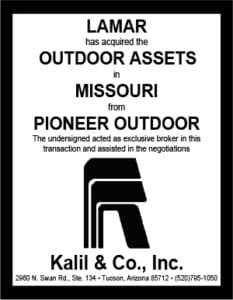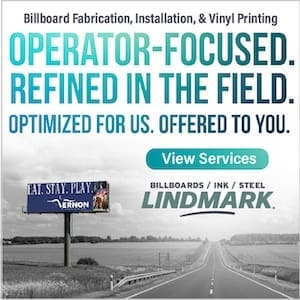
By Michael Wardle, General Counsel, Yesco Outdoor Media
Your attorney is your ally and advocate. Here are six tips for actions that you take to simplify the process of working with your counsel to get the best results:
(1) Establish Expectations up front
Neither you nor your attorney wants to address an invoice for legal services that reflects a mismatch of expectations. You can avoid this by establishing clear expectations up front. Consider doing the following to establish appropriate expectations:
- Be clear on the scope of the engagement. For example, a transaction involving a new billboard may include a lease, a contract for a new structure, obtaining entitlements (permits, variances, etc.), utility agreements, and advertising contracts. Decide which of these items you need help with and clearly communicate to your attorney which ones you need help with, and which ones you’ll handle on your own. Absent direction from you, your attorney has a professional obligation to dot all of the i’s and cross all of the t’s, which may or may not be consistent with your needs.
- Explain to your attorney whether you are looking for precise or general answers. The law rarely has black-and-white answers to complex problems. If you are seeking more precision, it will involve detailed research and can thus be more expensive. Even a detailed and expensive review can result in an uncertain conclusion. It may or may not be worth the extra analysis when your attorney knows up front that it’s not a clear issue. Ask your attorney beforehand if the outcome will likely be uncertain so that you can weigh the benefits of additional research and work.
- Avoid asking for an “abbreviated” or “quick” review. In doing so, you are asking your attorney to potentially take short cuts. That is contrary to his/her ethical duties. For example, if you are asking for an attorney to merely-glance through a 50-page document, both you and your attorney aren’t going to be satisfied with the result because items will likely be missed. If you need to narrow the review, it is better to ask for specific provisions to be reviewed instead.
- Disclose your perceived negotiating strength. Your attorney’s advice can be more appropriately tailored when he/she knows whether you have the upper hand in the transaction or not. An aggressive markup on a contract will only frustrate you and the other side when you lack bargaining power. In contrast, you may leave items on the table if your attorney doesn’t know that you have the superior bargaining power.
Involve your attorney at the front end with clear expectations. You’ll get better, more efficient service if your attorney isn’t brought into the middle of the situation to put out a fire without clear instructions.
(2) Separate Business Issues and Legal Issues
Every contract and every dispute has business issues and legal issues. Business issues usually relate to time, price, and scope. Legal issues usually relate to risk allocation (in transactions) or procedural issues (in litigation).
As the client, take charge of the business issues. Items like lease rates and escalators, closing dates, lease durations, rights of first refusal, what you are willing to settle a dispute for, and the like are business issues that are usually best negotiated businessperson to businessperson. Risk allocation items, such as indemnification clauses, are technical, legal issues; use your attorney to help guide the legal issues,
Sometimes legal issues straddle business issues. For example, a warranty on a billboard structure may have a disclaimer on the “warranty of merchantability”, which is a technical legal issue. The warranty may be for one year, but you may want one for two years, which is a business issue. Work with your attorney to categorize issues and establish the proper roles to negotiate them.
(3) Maintain Open Communication
Keep the lines of communication open between the business teams and legal teams on both sides of the transaction. Emotions escalate when communication breaks down. Legal issues become more expensive and difficult to resolve when emotion, as opposed to economics, is in the driver’s seat.
(4) Do Your Own Thinking and Make Your Own Decisions
Your attorney isn’t as familiar with your business, the transaction you are working on, or the problem you are facing as you are. Use your attorney as a trusted advisor, not your decision maker.
(5) Do Your Homework
The more you invest into researching the situation, the better you’ll be able to know what it is you need your attorney to help you with. Before you send your attorney a contract, read it first and advise your attorney of your instructions on the business issues. Before you ask a zoning question, read the sign ordinance first and form a specific list of questions based on your research. By doing as much research and thinking on your own, you’ll be better prepared to facilitate and understand your attorney’s advice.
(6) Ask for Advice, Not an Opinion
A “legal opinion” is a trigger-word for attorneys. It has a specific meaning to your attorney that goes beyond just getting your attorney’s perspective. In the practice of law, a legal opinion is formal, written explanation of a legal issue. Most law firms and some malpractice insurance carriers have very specific review and approval processes that must be followed before a formal legal opinion can be issued. Because of the higher level of scrutiny for a legal opinion, seeking an “opinion” is more costly that seeking legal counsel. So rather than asking for your attorney’s “opinion,” ask for advice. It will save you and your attorney from having to provide an awkward discussion about the intricacies of legal opinions, which aren’t likely relevant to what you are looking for.
[wpforms id=”9787″]
Paid Advertisement

















